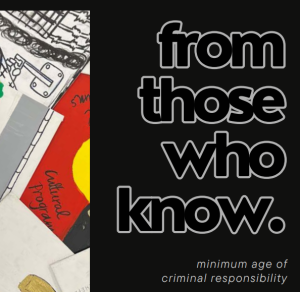 Today, Guardian for Children and Young People and Training Centre Visitor, Shona Reid, released a very special publication – and we’re excited to share it with you!
Today, Guardian for Children and Young People and Training Centre Visitor, Shona Reid, released a very special publication – and we’re excited to share it with you!
From Those Who Know presents the direct voices of children and young people in detention in South Australia, about a topic they know better than anyone: the minimum age of criminal responsibility.
In South Australia, that age is currently set at 10 years old. That means children who are in still in primary school can be arrested by police, face criminal charges and sent to detention.
At the Guardian’s office, we are firm advocates for raising the minimum age of criminal responsibility. So, it was welcome news when we heard the announcement earlier this year that our government is planning to raise the age from 10 to 12-years-old. As Shona told us,
“I am firm in my view that the minimum age of criminal responsibility should be raised to 14 years, urgently, and with no exceptions. My experience and advice from national and international experts have led me to believe that 14 is too young for any child to be in court or locked up in cells.
I do acknowledge that raising the age to 12, as the government proposes, is still an important first step in the right direction. Any day that a child can be spared from criminal justice processes is one more day we are able to support them, guide them and create a safer community for everyone – now and into the future.”
Following the government’s announcement, we jumped straight into action to make sure children and young people in detention could have their say – including preparing a special submission on behalf of 27 young people who bravely shared their views, experiences and words with our team.
Commenting on this important submission from children and young people, Ms Reid said,
“Every day, we see news stories and hear adults talking about ‘youth crime’ and their views on the problems and solutions – what is missing from these conversations is the views and perspectives of the actual people who are going through the youth justice system themselves.
To help address this, I have submitted to government the words of these brave children and young people who spoke out about what’s gone wrong in their lives, what they need and what would work going forward.
Their voices are direct and clear, and they are speaking to all the adults in their lives and with the power to change things. While we’re off arguing about money and laws and whose job it is, the young people are telling us what needs to change. Their solutions are far more sensible and less expensive than all the places and laws we build to keep them locked up.
They talked about their bad decisions and its impact on others. They also talk about growing up with no one to care or be there for them – some talked about this as something they have been missing from they day they were born. They said that detention at young ages did not help them, it did not teach them a lesson, it did not rehabilitate them… rather it made things worse. They said that they need people to be there for them when they make mistakes; they need safe places to go; they need safe people to be with.
The children and young people have spoken, and it is now on our government to dig deep and find the humility to listen, and the courage to give their ideas a try.”
Shona also made her own formal submission to the government’s consultation, which raised serious human rights concerns about the government’s proposed alternative diversion model for children under 12 years.
“I welcome the debate and exploration of raising the minimum age of criminal responsibility, but I am disappointed in the government’s plan put forward for children under 12 years. I am seriously concerned that the model put forward has the potential to inadvertently bring more children – who have never had contact with the law – into a youth justice and detention setting.
Raising the age is about taking children out of the criminal justice system, because we know that doesn’t work for them. But the model that government has put forward is, quite frankly, bizarre. It still lets police lock children in cells, it still funnels children into court processes and it still allows those courts to send children to detention. So, I have to ask, what’s in it for the kids? And how will this make our community safer?
I have told government that they need to go back to the drawing board and come up with something that will actually work and protect our children and our community. Come back with something that upholds international human rights standards, and provides genuine help and rehabilitation opportunities for those children who need it most.
I am confident that South Australian families, communities and our government are committed to finding better solutions for helping our children and our young people. We know that children and young people find themselves in these situations because they have been let down many times over their short lives. Let’s not let them down now. Lets look to how we can set them up for a prosperous future where they feel safe with us.”
To see what children and young people had to say, you can read the submission Shona made on their behalf here.
For those interested in something a bit more technical, Shona’s formal submission is also available on our website.
For more information about these submissions, you can contact our Principal Policy Officer, Alicia Smith, at gcyp@gcyp.sa.gov.au or on (08) 8226 8570.
